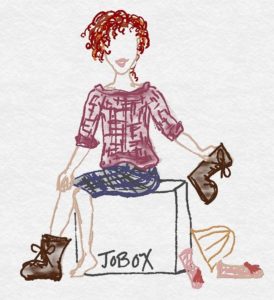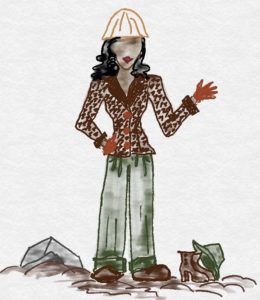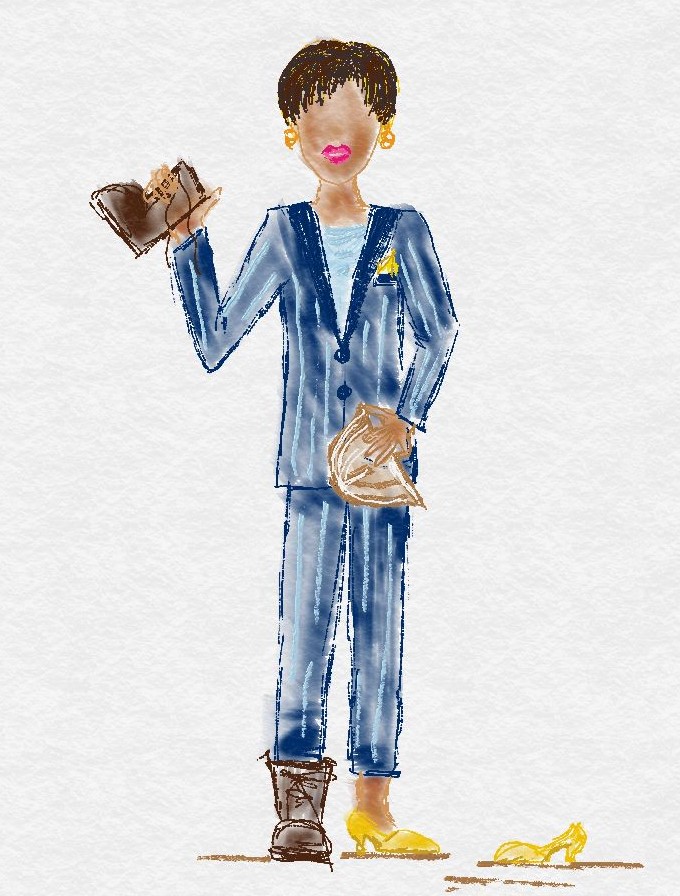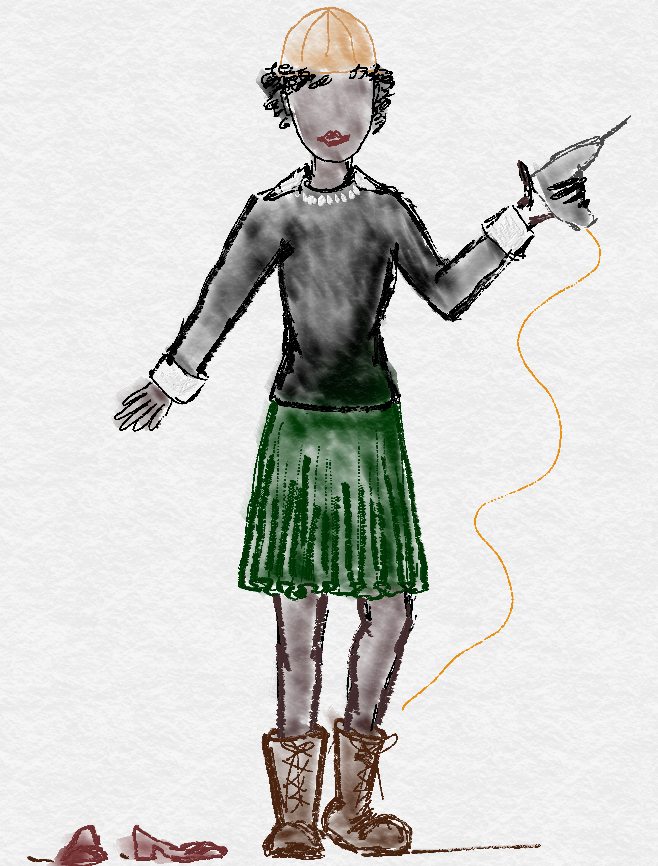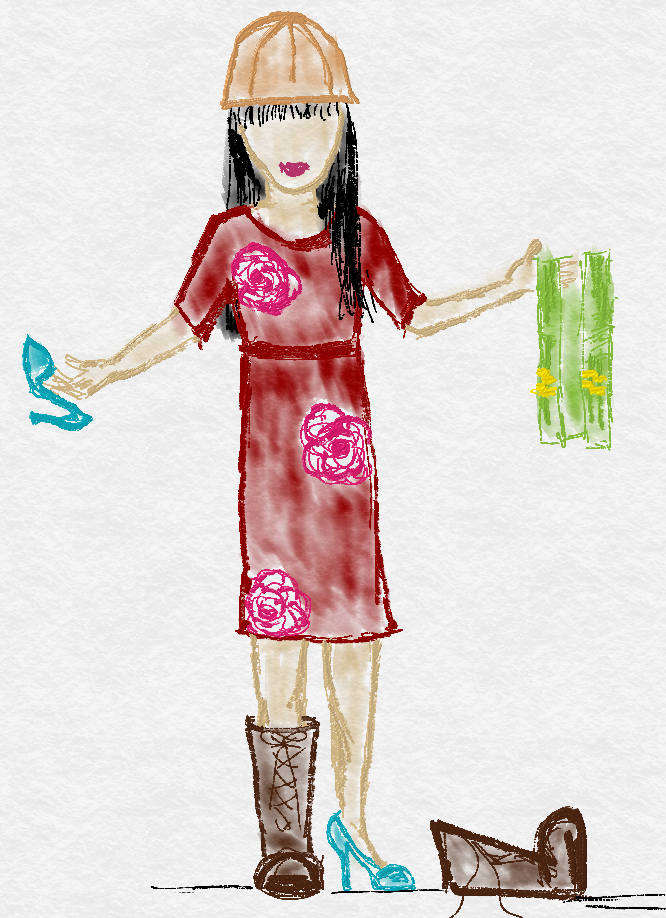Patterns for Success
Respond, don’t React
by Mia Painter, Guest Contributor
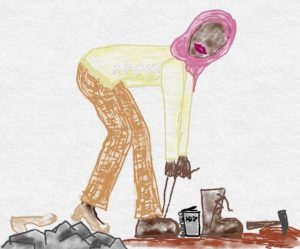
I was raised in a small family of women – mom, gram, two aunts, and a few cousins. My family had started out with some men, but the year I was two my grandfather and uncle died and my mom left my abusive father. I remember the women around me as strong, self-sufficient, generous, flexible, but only at times sensitive and outwardly loving. They all encouraged (and expected) me to do chores (lots of cleaning and mowing the lawn), to explore (keeping pet worms and having areas of the yard I could turn to mud factories), and to stand up for myself. Most importantly, I think, to who I am today – they expected me to do what I wanted to do, regardless of what those around me said. But here’s what I’ve been pondering lately…I think what I took from their lessons was to react, not to respond. My pattern of reaction (and not response) led me to where I am in my career. I’m (generally) happy with how my career has worked out but I wonder how it would have been had I responded more and reacted less. So now I’m starting to look at how I can respond to career situations and move forward with intention, not just reacting to situations with a gut reaction.
Reacting is what we instinctually or quickly do when an event or a decision or a confrontation happens. To me, reacting happens when I see something unjust or am exposed to a hard situation – and become angry or defensive or hurt. It also occurs when I see something as a challenge and charge forward to meet it head-on without much forethought.
Responding takes more effort and involves thinking things through. Responding means I keep my calm, think about what happened, and make an active, conscious decision about the best course of action (or inaction) to take. Responding isn’t always slower than reacting (though it certainly can be) but it is always about seeing a bigger and different perspective around the situation.
The most vivid memory of me reacting as a kid was in kindergarten (although it’s one of those memories that is now warped by my mom’s telling me about it so many times, so it’s a blend of my memory plus her story). It was free time and a boy (Brad) told me I couldn’t walk on the desks. Now maybe he meant that I shouldn’t, or that it wasn’t appropriate to stand on desks in school. But I heard him tell me I couldn’t do it and so I immediately took it as a challenge. I climbed up on the little kindergarten sized desks in my Catholic school jumper and walked around from desk to desk while the class looked at me in surprise. As you can expect, I was told to get down and to go to the principal’s office. My mom came to pick me up and asked what happened. I said Brad told me I couldn’t walk on desks and so I did. She told me good, that’s what I should have done! (And then followed it up with a discussion about appropriate times to walk on desks – i.e. not in class.)
Flash forward to college…end of my sophomore year and I had taken a variety of general classes but had not yet declared a major. My advisor told me I needed to pick a major now. I made my decision there and then in his office, and chose geology. Don’t get me wrong, geology is a good fit for me, but I didn’t do any long-term planning – I didn’t do any of the things I’d advise anyone who was choosing a career! I didn’t research options, would I need a master’s, what field of geology would I go into, what geographic region would I live in? I had taken “Geology for Consumers” the prior semester and it had included a field trip (as all good geology classes should). But something sparked in me that day when the class got out of the school van on the side of a road on top of a hill (all very much a typical day). That was the day I learned that I wasn’t just standing on a hill…I was standing on a drumlin! (A drumlin is an elongated hill formed by glaciers.) The hill got there somehow. The valley got there somehow. There was a process, a history, a predictable order to the landscape around us. I’m pretty sure that’s what my gut reaction was stirring up months later in my advisor’s office.
Ok, so I chose geology as a major. A year in and my new advisor suggested I double major and add in geophysics. I saw it as a challenge and agreed right away. Agreeing meant adding a year onto my undergraduate work, and it meant taking a slew of math and physics classes as well as geophysical coursework. Then I chose a graduate school and landed into the research that my advisor suggested. I was content, happy even. I got a job, moved, got married, had two babies, and kept working. All of this just happened as a series of my reactions to events that presented themselves to me. Each time I took the next logical step from where I was at any given moment.
But now I’m trying a different way. A few years ago while struggling with a loved one’s addiction, I learned the phrase “Respond, don’t React” and I applied it consciously in all aspects of that relationship. It helped me distance myself from the craziness of addiction enough to take care of myself. I eventually could see my loved one with a different perspective and it helped me continue to love them even amid the craziness. It helped me feel calmer, more in control of myself. In the past year I’ve had some challenging interactions with clients and staff, and one day the phrase “Respond, don’t React” came to me again. I realized I could apply this to my career as well – mainly in my day-to-day interactions to keep my calm and not do anything I’d regret!
Now I’m looking at my long-term goals and I’ve had the revelation that I can respond in situations and with decision-making to lead me to those goals. It had never occurred to me before the last couple months to me to write down career goals, and then to actually do something to achieve them. I’m not sure why this concept wasn’t part of my life to begin with – seems like it should be standard…have goals, do things to achieve them. But I can see now that a lot of my childhood was observing the women in my life reacting to their situations – grieving, moving on, getting out, raising kids, making ends meet. So many years of just doing the next logical step led me to this place, here, right now. It’s a pretty decent place. But now I want to try responding to the next career crossroad, situation, choice, and goal.
About me:
I’m a geologist and geophysicist for a civil engineering company. Much of my thoughts lately (when not focusing with all my might to meet deadlines, or to snuggle my boys, or to not be late for date night with my husband, or to keep our pet goldfish alive) are looking at how the decisions we all make shape our careers and the careers of those around us – particularly for women in an industry with mostly men, and for men in an industry with only a few women. Thanks Helen and Peggy for having me be a guest, it felt nice to have thoughts and to then write them down! Maybe there’s a pattern here.
Finding Your Voice
Speaking Up and Speaking Out

Recently I have had conversations with some of my friends and colleagues in the industry to try to explain a phenomenon I can’t quite wrap my head around. In a situation where there are a large group of professionals, are women are more inhibited to voice their opinion?
Here’s an example: the Deep Foundations Institute (DFI) holds an annual Hal Hunt Lecture on Communications. In 2015, the guest lecturer was Billy Beane, former professional baseball player and owner of the Oakland A’s. He is famous for applying statistical analysis to the evaluation of players. Beane delivered his lecture to a standing room only crowd which consisted of perhaps 90% men. Following the speech he entertained questions, all of which came from men in the audience. I am stereotyping but you could argue that the men who asked the questions were sports fans, or A’s fans (the conference was in Oakland), or fans of Beane himself. Now fast forward to 2016, when DFI’s Women in Deep Foundations Committee solicited sponsorships and selected the first female Hal Hunt lecturer- Dr. Mae Jeminson, the first African American woman in space. Dr. Jemison was a very captivating speaker, especially because she “nerded out” for a group of well, nerds. The audience in this case was very similar to the prior year: about 85% male. Unfortunately, there wasn’t much time for questions afterward— Dr. Jemison could only entertain 6 or 7. But not one of them came from another woman. I have to admit I was very disappointed about that. Why? Because I wanted to visibly express how important and significant it was for the women in the room to have her there.
In the Beane lecture I was trying to think something to ask him, for the sole purpose of being a woman who spoke out with a clever question. Nothing came to mind, and if I couldn’t think of a good question then I didn’t want to ask it. Also, I only began trying to think of a question once the Q & A period began, not throughout the lecture. So when Jemison spoke, I was prepared. As chair of the WiDF committee, I had the extreme honor of meeting Jemison and introducing her. I didn’t want to take any more floor time by asking my own question. But I could recruit others for the cause. As attendees gathered for the lecture, I scurried around and asked about 10 different women if they would consider asking a question following the lecture. I held the microphone at the talk’s conclusion and brought it over to those people raising their hands with questions. But as far as I could see, not one woman held up their hand while the room was full of questions from men.
I am trying to understand this better. I can tell you some general thoughts and preferences I have about speaking up in a crowd. I am generally content to listen passively to a debate or discussion unless I feel strongly about the point I am making or have a motive behind speaking up (e.g. visibility). If I don’t speak up it doesn’t mean that I don’t have an opinion. But I often keep quiet and absorb what is going on in the discussion. I also know that if I am putting effort into formulating a response, I don’t get as much out of the dialogue.
I don’t respond well to someone urging me not to be shy or to “come out of my shell”. This isn’t an issue of shyness. Those who know me well know that beneath my (hopefully?) sweet and personable exterior I have a strong personality and I am very vocal about things that bother me or excite me. In a group setting this often doesn’t come through. Sometimes I don’t feel like exposing myself and would rather make a more personal connection one on one or in a smaller group. I would much rather stay quiet on many group topics including technical issues (unless it is the corrosion protection of soil nails).
I must also admit to waiting to get a feel for the flavor of the participants in a group conversation before sticking my neck out. I wait to hear part of the discussion to get a better idea of whether my thoughts will be well received and will resonate with others in the crowd. Why? I have yet to see a Facebook debate about politics, sleep training your child, or whether cauliflower is a valid pizza crust that ended with someone being swayed to the other side, or even ended in a civil manner, so I often think what’s the point of even trying?
Now let’s talk about why my question had to be a good one. We’ve all heard the phrase “there are no stupid questions”. And I absolutely agree with that…unless they are my own. I want my questions to be thorough, respectable, and witty if possible. I want to impress the person I am asking with the depth of understanding that I have about the topic, but appear humble and willing to receive the knowledge they are about to impart. Not to mention bonus points if the question is useful or meaningful for other listeners as well. I am slowly but surely working on these inclinations. I believe this is one of the hurdles that many women need to overcome: to stop judging ourselves so harshly.
There are times when I am on a conference call for example and don’t follow the line of conversation. In the past I was embarrassed to ask for clarification, and assumed that I would figure it out myself later. I didn’t want to hold up the call or inconvenience anyone. This goes hand in hand with a propensity to apologize for things. My softball coach tried so hard to break me of that habit. When I threw a bad pitch in practice I gushed sorries at him and the catcher. But you know what they say, there’s no sorry in softball!
I think these tendencies are factors in some women avoiding STEM careers. A study (Dweck 2007) found that 5th grade girls routinely outperform boys in school subjects, including math and science. But when given an unfamiliar or complex subject, girls were quick to give up—those with higher IQs were actually more likely to quit. Boys saw the difficult material as a challenge and redoubled their efforts. Realizing these general predispositions can help us mentor young women in our field as well as save us from ourselves.
So, should we force ourselves out of our comfort zones? Men that I have discussed this with have assured me that it is just as difficult for many guys to speak up in a group setting. Some have indicated that throughout their lives it has been less socially acceptable for them to keep silent, so they have been forced against their introverted personalities to be vocal. I am glad to hear this type of revelation from men because it reinforces the point that personality and environmental influences are major factors as well. Of course there are also plenty of men and women who like to hear themselves talk.
One male colleague that lent his wisdom on the topic pointed out that all of these numbers and observations are skewed by the male to female ratio in geotechnical engineering. So something that seems to be an overwhelming pattern, such as only men asking questions at the DFI Hal Hunt lectures, actually makes sense for the high percentage of men in attendance.
In conclusion, I believe we need to speak up and speak out, even if it goes against our natural affinities. Do you feel comfortable speaking out or do you have to force yourself to be vocal?
Our Sacrifices, Their Future
Driving Toward the Future
by Ann Schmelzer, Guest Contributor

Did you see the Super Bowl Audi commercial with the young girl driving the boxcar? Here is the link in case you missed it: https://www.youtube.com/watch?v=G6u10YPk_34
The commercial drew some criticism in its pre-Super Bowl preview; Audi North America only has two women in senior leadership positions and no women on its senior management board. That being said, they still spent millions of dollars to make a statement, and are following up on that by committing to 50 percent of their graduate internships going to women. I hope that broadening of the initial candidate pool causes a ripple effect all the way up the chain.
Setting that aside for a moment and focusing on the commercial itself, it caught me off guard. Sandwiched in between commercials that were loud for comedic value, this was quiet and stirring. I was immediately pulled in by the beautiful camera work and the isolated string music.
Outside of my day job in a “dirt adjacent” field, where I am typically only one of a few women in the room at any given time, I am a soccer coach. I have to say that, however gender-skewed my day job is, my extracurricular choice is downright barren. I’ve been coaching for over eleven years now; I can still count on one hand the number of female coaches I’ve coached against.
I get asked by friends and family all the time when I’m going to hang up my coaching cleats. To be fair, they have a point. The spring season starts with winter training indoors in January and goes through mid-June. It requires somewhere in the range of 20-30 hours per week, and let’s not discuss the amount of additional time in the car between training, games, and tournaments.
By May of each year, things are usually spinning out of control on the home front. Groceries? What groceries? When is the last time I mopped? Dangerous question. That’s not dust on the entertainment center, they’re unicorn sprinkles… whatever I need to tell myself. That circumstance inevitably drives the question from those who know and love me, “Annie, how long are you going to continue to do this? Your job (subtext: the thing that pays your bills) is really demanding. Do you really have time for this?” I usually mumble some version of “I don’t know and, in the meantime, I’ll try to pin down one of the garden gnomes to see how he feels about scrubbing toilets.”
I’ve never had a smooth answer to this question. The further I get into my career, the more it comes up. I think the commercial grabbed me in the way that it did because I have known dozens of little faces just like that girl in the boxcar– hopeful, determined, sweaty, dirt-stained faces. I want those faces to know that there’s someone out there who looks like them and is also determined, nervous, and trying to navigate triumphantly.
I have coached against a lot of guys; it can be a very testosterone-fueled experience– coaches yelling at their players, yelling at the referees, sometimes yelling at me when I deign to push back on a bad call or a late tackle. It gets lonely. Week after week I show up to face another coach who thinks he knows better than the girl coach sitting on the opposite bench. I’m quiet on the sideline. My girls know that I do my talking at training and games are for them to show me and themselves what they’ve learned. Of course I’ll make tweaks or share some encouragement, but that is rarely what I see on opposing benches. That’s not to say that they aren’t good coaches with lots of experience, but it’s interesting (and occasionally horrifying) to me how that can and does show up. This isn’t an “us vs them” commentary, it’s simply a reminder to me that hopefully there’s some value in a dust-ridden entertainment center and a pb&j for dinner more nights in a row than I care to think about.
No coach is going to be perfect. I once read that “a coach can make a team 10 percent better or 30 percent worse”. I really believe that. I also believe that the world belongs to those who show up. Maybe next time I get the question about when I’m going to stop coaching, I’ll share this commercial instead of muttering about garden gnomes and toilet bowls. Really, is there more of a reason needed?
Well Read
Booking an Adventure

I am a nerdy fan of any type of personality test. I love evaluations like Myers-Briggs, and I’m fascinated even by scientifically unsupported associations like astrology. We all know that psychology is a soft science, and the interpretations and nuances are never-ending. Plus, I am constantly intrigued by people.
To that end, I am obsessed with behavioral patterns and likes/dislikes that define people’s personalities. If you happen to land in a discussion with me and a group of people at a cocktail party, I almost certainly will ask you, “What’s your favorite movie?” or some similar question. I love to view people through their preferences.
One of my favorite questions is, “What do you read?” You don’t even need to be stuck with me over cocktails to be presented with this query. I might bump into you on the escalator at Macy’s and ask. Why? Because I love to read, and because an individual’s reading material is a window into not just their* soul, but into their situation in life. We read for so many reasons, to fill needs that are perennial as well as immediate. When someone tells me what they read, I learn two things. I understand more about their inner workings, and I get a possible lead on good reading material.
For me, reading most often balances the very very left brain environment of my daily work day. I read almost entirely fiction, unless it’s a cookbook or a gardening book. I currently am reading The Code Book, by Simon Singh, about the history of codes and ciphers, but this is very unusual. Don’t give me a biography, a discussion about the current economic/political climate, or anything scientific. I live that all day. And if you hand me any type of self-help book, I’ll assume you don’t want to be friends.
Over the years, I have noticed a number of trends in my reading, and they all mostly serve my intellectual and emotional needs. The protagonists in my books are usually female. Typically there is some form of romance, even if it’s incidental or a very small sub-plot. Often there is some type of scientific or fantastic angle. I hate books with jaded, bitter, or otherwise fundamentally negative protagonists. There are definitely books in my rotation that some might call fluff or trash. (My dad does). And the ending MUST be at least marginally happy. If someone is going to die or the world is going to turn dystopian, keep that nonsense to yourself.
One of my absolute favorite series, and some of my all-time favorite reads, are the Outlander books by Diana Gabaldon. Do I love these because they’re dramatic and one of the main characters is a 6-foot gorgeous Scot from the 1700s? Of course – do I look stupid? But I identify with these books mainly because I think Gabaldon has created one of the truly complete female characters in recent literature. Claire Fraser – nurse, then doctor, wife, counter-revolutionary, counselor, spy, advisor, mother – has been painted with a depth and a subtle feminism that is unusual even in current fiction. She goes about her medical duties with only the knowledge that she wants to heal people. She doesn’t get bogged down in whether a woman should be doing these things, even when others around her do, and she doesn’t make a crusade of it. Her character embraces adventure and doesn’t get whiny when she is uncomfortable. She is not afraid to show emotion, and she doesn’t feel diminished by the fact that she loves her husband so much that she willingly dramatically alters her life for him. She isn’t afraid to express her opinions, even when it makes a situation uncomfortable, but she is sensitive to the constraints and cultural limitations of people around her. I truly feel reinforced when I read these books because the heroine controls her own destiny.
Some books have proven to illustrate the perceptions of women in certain roles in our society, and I have read these as information on the thinking of people I deal with every day. Sara Paretsky, author of the V.I. Warshawski books, wrote into one of her novels a scene in which Warshawski, the private detective heroine, wanted to go unnoticed so she donned a hard hat and a clip board. I laughed for 20 minutes and then e-mailed the author and assured her the easiest way for a woman to be noticed is to wear a hard hat and carry a clip board. She actually responded and said she was surprised, but that just goes to show what the average person doesn’t know about being a woman in a field populated primarily by men. Amen, sister.
My search for new and interesting books that help me to fill in all those divots and blank spots in my life, for books that inspire me and those that give me hope, will not end until I can no longer read. I should mention that I also read piles of magazines, blogs, and a variety of other on-line publications. Thoughts and words are seeds that grow into beautiful and interesting actions and emotions. All of these sources help me to navigate the path that I’m following, and I know I am not alone in this practice.
So, here we are in this burgeoning online community of smart women and men who are the Underpinnings cocktail party. Before I go to refresh my pomegranate martini, you know what my inevitable question will be. What do you read?
(Author’s Note: Helen has assured me that the use of the singular “they” is now acceptable in mainstream publications and using he/she is awkward and passé. I feel very certain that Sister Mary Prisca Pfeffer would not agree and will rise from her grave and smite me. My death will be on Helen’s head).
Bought and Paid For
How Do We Ignore the Voices That Say We’re Not Enough?
A couple of weeks before Christmas, I was watching TV and a trailer for the movie “Hidden Figures” came on. A man in the movie asked Janelle Monae if she would want to try to become an engineer if she were a man, and she said, “No, because I would already be one.” And I cried.
The next week, I was in Barnes and Noble buying a book for my niece, and I happened upon the book, “Isabella, Girl in Charge,” which uses plays on words to introduce influential women in political history. I got to the last page, where the daddy has Isabella on his shoulders as a woman is being inaugurated President of the United States, and I cried.
As I was fleeing the curious stares in the bookstore, I was mentally yelling at myself, “What is the matter with you?” Don’t get me wrong – I am a board certified crier. If you yell at me on a jobsite or try to start a fight in a meeting, I won’t shed a tear. But if two people fall in love during a 15-second coffee commercial, or my football team wins, or there’s a ribbon cutting at the car wash down the street, I’m a torrential downpour worthy of a Weather Channel official name. I’m an empathetic weeper, more likely to cry with joy than with sadness, so tears are not unusual for me on an average Monday.
It took me several days of evaluation akin to a good wall failure analysis to figure out what was going on. I know that I cry at movies, but my reaction to the trailer was a bit much, even for me. And I was disappointed in the election results, (even though I don’t agree with all of Secretary Clinton’s policies), but there was something else there, something that reached beyond my distaste for President-Elect Trump’s attitude toward women.
I have to admit, I was shocked and well, to be honest, embarrassed when I finally realized that my emotional reaction really was a latent condition that was triggered by the election. It made me realize that I bought it. Bought what? The idea that women are ever so subtly just not as good as men in certain areas. Somewhere, deep in the recesses of my psyche, some little piece of me actually has believed the pervasive social perception that women are less in some parts of life. To be the star engineer, to be president – if it happened it was a fluke because we aren’t really equipped to do that. I’m not really equipped to do that.
How could this be? I’m still amazed. My feelings certainly had nothing to do with the way I was raised. My parents NEVER differentiated between their two boys and two girls. They asked us, “What do you want to do? What do you want to be?” They drove me to Little League baseball practice, not because they were on a feminist crusade, but because my brothers played and I said I wanted to, too. I told them I wanted to be good enough to play professionally when I grew up, and they said, “Great! Work hard.” (Thank goodness I quickly discovered that I hate baseball and that football is life). I could have said I wanted to grow up to be the foreman on an offshore oil rig and they would have sat down with me and come up with a plan involving a good education and a lot of hard work.
I have been fortunate enough to be surrounded by supportive and equality-minded friends and family my whole life. And I can’t think of anyone who has met me for more than 3.6 seconds who would classify me as a pushover or a doormat. So how did this happen?
Stepping outside my head a bit, it occurred to me that apparently the fabulous friends and family didn’t create enough of a wall to keep the chatter from the rest of the world out. I went through school only one year after my wonderful, brilliant older brother. No matter what I did, no matter what great test scores I got, someone always was around to mention, “Yeah, but her brother did way better.” In high school, my school didn’t have calculus*, so three of us lobbied to drive over to the nearby boys’ school during lunch to get to take calculus there. We didn’t get the arrangements made until the first week of the school year, so we couldn’t take the top class, which was a college credit class. But we enrolled in the advanced calculus class, and we got the top three test scores for the first four tests of the year. Several of the teachers commented, “They got the best scores, but it’s because they’re not in the top class.” And in college, I heard repeatedly that girls do well in engineering school only because they study more. It didn’t help that I didn’t particularly like math, and English was my favorite subject. This only reinforced the stereotype that I wasn’t really meant to be there.
Even in my professional career, where I own my own business and I’ve worked through some brutal conditions on remote jobsites, I have listened to snide little remarks about how I got things done because I got along with the guys, not because I was technically competent or because I had good management skills. And there has been no shortage of well-meaning people who didn’t realize how condescending it is to act like it’s “cute” that a little woman is ordering guys around on a construction site.
I suppose the constant outside influences somehow penetrated my rock-headed Irish consciousness over the years. And for that I am embarrassed, and disappointed, and angry. I think the possibility of a woman becoming President somehow was a subconscious trigger for me, a sign that maybe all of those people were wrong. We say all the time that anyone can be anything in the United States, but I think that a woman becoming President would make a nice concept a reality. And somehow it would validate the theory that women are just as capable as men of doing anything – math, science, world domination. And it would validate that who I’ve been all these years is not a façade over an inadequate structure.
Of course I’m crying as I type this, and I hope that little girls everywhere share no inkling of the insecurity I apparently have felt for many years. I hope that we have a woman in the White House in the near future, not because we need to prove anything, but because we can. In the meantime, I’m going to concentrate on exorcising this demon of doubt from my soul. I’m not happy that the election turned out the way it did, but I’m glad that the trauma of it wrenched free a problem I didn’t even know I had. Who knows? Maybe that woman President will be me.
*Note: Mercy Academy in Louisville, Kentucky, has more than made up for lost time, becoming the first all-girls high school in the U.S. to have a STEM-accredited program. Mercy also launched an award winning ad campaign several years ago that centered around the theme “You’re Not a Princess.” Go Jaguars!
Emotional Factor of Safety
Crying At Work (About Work) Isn’t Okay
Women are often stereotyped as being emotional, flighty, weak, and thinking with their hearts and not with their heads. Men can be portrayed this way too- if a man tears up at an emotional scene he is “in touch with his feminine side”.
Engineers and scientists on the other hand, are typecast as being analytical, impartial, and unemotional.
So women can’t be engineers and scientists then right? It just wouldn’t work out. How can a woman focus on calculations or problem solving when she is feeling sorry for the client who now needs 6 ft rather than 5 ft diameter shafts?
I have seen women in my profession intentionally present a starkly unemotional image. They put a Factor of Safety on sensitivity and overcompensate to the other extreme to appear stoic and reserved. This may be because they think that will fit in better, that they prefer to keep their feelings private, or that they are worried about making others in that environment uncomfortable.
I don’t object to any of that. If you truly have a reserved personality, I am not implying that change is needed. But if you are suppressing your sensitivity, do yourself and your co-workers a favor: to thine own self be true!
You: In-Situ
I believe that one peripheral reason why women are leaving the STEM field is because not only do they feel that they can’t express their true personality at work, but they feel that male co-workers won’t understand or care about their lives outside of work.
How often do we hear the catchphrase “work/life balance”? I might as well continue with the stereotypes on how each generational group in the workforce interprets this catchprase. Baby Boomers are too busy industriously working to stop to think about that question… Gen Xers are content with getting in a round of golf, a pedicure, or a family outing over the weekend before heading back to the grind on Monday. To Millennials it means to build a wall between the two; leave work at work and home at home and fiercely defend your personal life and time. But perhaps an unintended effect of this attitude is that Millennials feel stifled and mechanical in the workplace. This strategy may work in a more solitary, fixed-hour profession, but most of us in the geotechnical field spend over 50 hours per week on the job, whether in an office, on a project site, or traveling and meeting with clients.
So I say: it’s okay to be you. Even in the office. The more you show who you are (while remaining professional) the better you are going to perform as part of a team. It will also be easier for team leaders to understand how to utilize your strengths. A colleague recently pointed out to me that when you hire someone, you can’t pick and choose which of their qualities you get. You can’t have their strong analytical abilities but not their shyness, or their great public speaking skills but not their tendency to get stressed about deadlines. So rather than suppress your personality traits, follow this year’s Girl Scout cookie slogan “Be Unique, Be You.”
I don’t know if what I said earlier about Millennials is accurate- after all, I am not one of them, but I am advocating for breaking down the wall between your profession and your personal life. If we share our struggles and triumphs then workplace communication will improve and lead to better problem solving and increased productivity which often translates into profitability and who can complain about that?
So share the 10K you are training for, the videos of your kid making that adorable noise, or that you binge-watched episodes of The Walking Dead all weekend.
I believe we should also share the hardships that we face in our personal life as well. This is an extreme example, but it’s something that I think we need to talk more about as a society anyway, so I’m plunging ahead. Between babies #2 and #3 I had a miscarriage. It was heartbreaking and very emotionally draining. I debated telling my supervisor and the managers of projects I was working on. I knew another co-worker had experienced two miscarriages but chose not to say anything. Ultimately I decided it was the right thing for me to do. I wasn’t asking for special treatment or time off. I was looking for support and understanding, and I was overwhelmed with the outpouring of compassion that I received. It really made the situation easier to handle, and I didn’t have to hide my feelings and emotions and pretend that everything was okay.
There’s No Crying in Stratigraphy
Having said all of this, I will now present the other part of my dichotomous message: “Please don’t cry about work while at work!” As a member in good standing of Criers Anonymous, trust me when I say that I understand the magnitude of what I am asking. My eyes fill with tears when veterans march by in the community Fourth of July parade, and when I see my kids meet Peter Pan at Disney World, or when something reminds me of my grandmother who passed 11 years ago. I cry at both happy and sad things and most often when I am tired and/or frustrated.
So I understand. You’ve put a lot of time into that concrete beam design. You’ve brought it home for the past two nights to work on and checked and double checked your calculations to account for the high shear forces. But now at the last minute, the project manager decides to go with a steel beam instead and you will be at the office until midnight redoing the calculations yet again.
I don’t care what you need to do to prevent it, but put forth a great effort not to cry in front of your co-workers (in particular your supervisor) about work. Take a quick break, excuse yourself to run out and grab a cup of coffee, or if you’re Peggy, a new shade of lipstick at the drug store. Turn on the waterworks if it will help relieve some of your tension while you take a little break, but return to get the job done.
Sometimes you don’t have the luxury of a quick escape. You are stuck in a meeting or a one-on-one performance evaluation with your supervisor where you are facing criticism. Try your best to remain professional and not get caught up in the emotions of the situation.
My rationale for this supplication is that people react in a variety of ways when they see another person get emotional- from pity and sympathy to annoyance and disgust. For you it may be a way to release your feelings and end up refreshed and ready to tackle the next problem. It may be a tool that you use to prevent frustration from building. But by crying in the workplace about work issues you are distancing yourself from your co-workers, both female and male. Your crying can be interpreted as manipulation, or that you are too stressed to adequately perform your job. It may come across as immaturity or trying to evoke sympathy from a female or male superior.
Humans, both male and female, can be affected by extreme displays of emotion. Someone with a flaring temper can be intimidating and aggravating to those around them. The co-worker who is consumed with persistent indignation about their underserved bad fortune can be a distraction and an annoyance to others. One male colleague confessed to me his inability to think straight if a woman came to him crying about a technical issue she didn’t understand, for example. He couldn’t help but think of his mother and his sister and be overwhelmed with empathy. He would provide assistance, even to the detriment of his own deadlines. Afterward he felt resentment about the situation because he felt exploited, particularly if it happened repeatedly.
A couple of years ago, I worked on a very complex support of excavation design for a property owner. It took weeks to complete; the time commensurate with the level of risk involved. The project was intense and I spent many hours conversing with the structural engineer and the owner, educating them on the design assumptions we were making. Because of the time-sensitive nature of the project and construction finesse required, we recommended a specific specialty contractor that we trusted to handle the complexities of the project. When the contractor came on board, they told the owner they could redesign the excavation support more efficiently. We explained to the owner that the design could certainly be completed effectively with less retaining force, but considering the myriad variables involved, we recommended the more robust system. At the very least, if the contractor’s proposed system was used, the instrumentation monitoring program should be expanded. The owner elected to do neither, and hired the contractor to redesign the support of excavation. When I found out, I was furious and so upset that I burst into tears. I cried to my supervisor and co-workers and anyone who would listen. I was moody and depressed about it for a week. I vowed never to speak to anyone from the offending firm. Looking back, I wish I had not made such a scene. After all, business is business and ultimately it was the owner’s decision to make. We got paid for our work and have continued to work with all parties involved on other endeavors. But I know that I negatively impacted some of my co-workers’ opinions of me, particularly the staff that assisted me on the project. Since then, I have made an effort to rein-in my emotions on project-related efforts and set a better example.
So, bring your true self to the office but enough of that sniveling, buck up and join me in this No Crying Zone. If you disagree, I’d love to hear it…I’ll just try not read your comments while watching videos of soldiers returning home to surprise their children.
Happy New Year
Happy Holidays – Whatever That Means to You
Merry/Happy Something
It’s the end of December, and avoiding a holiday of some sort would be a difficult task. This is the time of year that emotions and social activity seem to hit a crescendo, sounding a tone that provides a soundtrack for our lives for at least a few weeks, if not more.
As the activities increase, often so do the responsibilities…and the expectations…and the preconceptions…and the guilt. We want to make sparkly shiny holidays to remember for our families, and we try either to overdevelop or hide these Martha Stewart-esque tendencies as we go about our professional lives. We entertain fantasies of moments under the mistletoe based on Hallmark Channel movies, (you can admit it – this is a safe space), while trying to maintain a tough, no-nonsense attitude on the jobsite. And we make donations to the Charleston Animal Protection Society by buying their annual Firefighter Calendar (FIREFIGHTERS WITH PUPPIES) while trying to pretend we’re really excited by the annual ASCE Bridges calendar (okay, maybe you are, but FIREFIGHTERS WITH PUPPIES).
The holidays don’t change the issues we deal with the rest of the year. We’re multi-faceted, interesting women who can’t be pigeonholed. The only way we can reinforce that idea is to share with each other all of our stories and special moments to affirm their importance.
We wish you a fabulous Christmas/Hanukkah/Kwanzaa/Winter Solstice/After-Christmas Shoe Sales, or whatever you’re celebrating. Good luck making a papier mache lobster head, or baking 4,000 cookies, or finding the perfect gift, or even getting your hands on a signed copy of the ASCE Bridges calendar. Let us know what fabulous things you’re doing – here are our versions:
Helen- Christmas is a Checkbox
Right now a lot of things in my life are a blur and get finished “just in time” or are deemed noncritical and shuffled to another list. If possible, this kicks into an even higher gear during the holidays. Christmas has always been one of my favorite times of the year, and was one of the reasons I wanted to have my wedding in late December. Now it is more than a little emotional since I got divorced last year.
At this time in my life I am in Mama Bear/Warrior Woman Mode, or MBWWM for short. I typically sleep 4-5 hours a night and then charge about the rest of the time from one thing to another, juggling two demanding part-time jobs, involvement in professional societies, three young children, multiple sports and activities for the older two kids, one Brownie troop, and a partridge in a pear tree. The days are long but the years are short, as they say. My life exists in lists: grocery (of course); long-term professional endeavors such as technical paper topics; what is due this week in school: homework, quizzes, pretzel money, basketball sign-ups, contribution to a class party, or the book fair; clients to reach out to for business development; and what we are planning for the next scout meeting, outing, or camping trip.
There are also the worries: are my kids eating healthy enough, brushing their teeth sufficiently, getting enough exercise, doing okay with the divorce, making the right friends, learning enough in school? Is it time to go through their clothes and sort things that don’t fit, give some toys away to charity or to younger cousins, or potty train the youngest? Am I progressing quickly enough in my professional career, is the specification I wrote sufficient for that project, will the contractor change the schedule yet again, and am I getting exposure inside my company and beyond it? These worries don’t stop because of the holidays- if anything they intensify for me.
I am not just playing Negative Nancy to Peggy’s Suzie Sunshine. The “before-children me” avidly followed Penn State football and Phillies baseball, loved having dinner parties and making breads and desserts, read books from numerous genres voraciously, loved hiking with my dogs on the weekends, binge-watched Buffy the Vampire Slayer, ER, and the X-files, and made plans to have drinks with friends bi-weekly. But right now I am the “single-mom with young children me” and much of that has been pushed aside while I have fully taken on this role.
But I am very fortunate to have met women through professional societies who report that there is a light at the end of the tunnel. Their children are grown and they are free to travel, work more, play hard, and rediscover themselves. An overwhelming majority of them are divorced as well, which I thought was interesting enough to point out, but I won’t speculate on this point today.
So, if all that is part of my “normal” life, what does it mean for the holidays? Aside from more lists: addresses for Christmas cards and gifts for the bus driver, teachers, the kids’ nanny, etc., it means instilling hope, love, and thankfulness in my children. I carry on the traditions of lighting an advent wreath at family dinner, cutting down our own Christmas tree, going to Christmas Eve mass, and leaving cookies and milk out for Santa. We have new traditions including making gingerbread houses, seeing a festive movie with the scouts, and doing good deeds with the help of our Kindness Elf (not Elf on the Shelf!). It also means stopping to appreciate the wonder that a 7, 5, and 2 year old experience on Christmas morning and expressing the gratitude that I feel toward my family and friends, and especially my parents, for the support they give me. Then I’ll cross Christmas off the list and move on to the next thing!
Peggy- It’s a Wonderful Life!
I grew up in a very close, Irish Catholic family, and we had more Christmas traditions than I could describe. In addition, I am a hopeless romantic, and the sparkly happiness of the holidays feeds right into my rather ridiculous love of all things sappy and festive.
Every year I hear and read endless comments/articles/doctoral theses about how difficult the holidays are and how tragic it is that everything is so commercial. But I tend to take the opposite stance. I love the holidays because there is more optimism, more kindness, more love than during the rest of the year. A pessimist would say it’s sad that people can’t be as kind and generous as they are during the holidays. I say isn’t it wonderful that people are better versions of themselves for part of the year? Doubters decry the commercialism of Christmas; I am happy that the holiday gives a number of people money to feed their families, and the constant commercials make some people take a moment to reach out to loved ones when they normally would not. Yes, I am Suzie Sunshine, and I’m not sorry. The guys on my construction sites get homemade cookies from me, and they’re not sorry either.
Many of my favorite things are holiday-related, because the season seems to act as an amplifier for emotions and reactions. My favorite date scene in a movie is the shopping/dinner date in the 1994 version of “Miracle on 34th Street.” My favorite dance scene in a movie is the Vera Ellen/Danny Kaye number at the club in Florida in “White Christmas.” My favorite shopping day of the year is my annual day at the mall in December with my mom and my little brother. And although it’s not my absolute favorite food, I absolutely love spending 5 or 6 hours making fruitcake in mid-November from my grandmother’s recipe and soaking the 12-pound cake in bourbon every week so the family can enjoy a little bit of family history at Christmas dinner.
It amazes me when clients ask for last minute drilling the week before Christmas, but I’m much less angry than I am when confronted with unreasonable requests the rest of the year. And sexist remarks have much less sting when Harry Connick Jr. is singing about Christmas Dreaming in the background. The happier I am, the stronger I am to take on those who don’t believe in me.
Even if you don’t live in my little glitter-filled, sugarplum-encrusted world, I hope you can find a way to experience some joy in the holidays (FIREFIGHTERS WITH PUPPIES). Every little bit of happiness makes you stronger, and there’s a lot of stray bliss lying around during the season.
United We Rock
Weaving Bonds That Don’t Break
Family vacations in my childhood were spent in many different locations. The agendas were varied, the adventures were comical, (including the Exploding Station Wagon Incident of ’78), and the sibling bickering was typical. But the one constant among all the excursions was the inclusion of a visit to a historic site somewhere along the way. Civil war battlefields, aircraft carriers, forts, and so very many cannons – we saw it all.
This thread of military history also invaded our family dinners, our discussions on long car rides, and our family movie nights. I swear the soundtrack of my childhood has the low drone of a B1 bomber somewhere in the background.
Every member of my family loved these stories and artifacts of past conflicts…except me. I longed for a visit to whatever mall we were near or an overnight backpacking trip in the local state park. Mostly what I took away from the endless parade of war movies was that they wore great clothes in the 1940s, and the men who fight in wars are really, really young.
However, one fact did embed itself in my brain despite my aversion to all things war. My dad spent an evening explaining the Battle of Culloden to me one night after I mentioned all the really gorgeous plaids in Great Britain. He explained that the Scottish clans weren’t allowed to wear their clan plaids after they were defeated at Culloden. The British cemented their victory by removing the clans’ pride and identities. He also said that one of the main reasons the Scots lost the battle, in addition to being outnumbered and underequipped, was that they spent so much time fighting with each other that they did not present a united front against the British. They beat themselves by putting their individual clan goals above the goals of the country.
That problem from almost 300 years ago is something I observe today as women continue to struggle for equality. We repeatedly state that we must work together, we must unite. But unity is hard. And I believe this is one area where we need to look to ourselves to fix some of the problems that undermine our success.
As women, we have a tendency to be defensive about what we do to the detriment of women in other life roles. Professional women, particularly those of us in male-dominated fields, will scoff at women in “fluffy” positions like actresses and models. We don’t admit it, but we all have made some sort of comment about full-time moms, something along the lines of, “Wouldn’t it be great to only have to worry about taking care of the house and the kids?” And we pity women in unskilled positions – waitresses, retail salespeople – without having any idea of the quality of their lives and without valuing their contributions to society. The women in those categories make similar comments about professional women: “Oh, good for her that she has her career, but she doesn’t have much of a family life, does she?”
We actually have no right to stereotype, pigeonhole, or downplay the lives of women in other roles. Are they happy? Are we? Don’t we need all sorts of people in all sorts of roles to have a well-developed society? But women have spent so many centuries fighting for the few tiny crumbs available that would allow them control over their own lives that we view each other as adversaries. Instead of saying, “Good for her. She has made millions of dollars contributing to the arts and entertaining people as an actress, and now she can feed her family and send her kids to college,” we say, “Yeah, must be nice to just wear a bunch of gorgeous clothes and act in a movie and give interviews and make all that money.” Instead of saying, “I’m so glad she is able to make the most of her abilities and care for her family to the fullest extent possible,” we say, “Can you believe she gets to watch daytime TV and go to the grocery before 5:00?”
The bottom line is that no life path is better or more worthy than another. We should be taken seriously no matter what we choose to do. Unfortunately, history has dictated that women have not had a choice in the past. Now that we (mostly) do, we are insecure and self-conscious about the choices we make. We express that insecurity by denigrating those who didn’t choose our path.
In order to reinforce the worth of our choices, we have to support each other. I don’t mean we have to support each other as women in male-dominated fields. I mean we have to support all women. Every path is valid or none are.
The ladies in Hollywood have the right idea. Reese Witherspoon just started a production company intended to celebrate the triumphs and issues of women. Instead of saying, “Ugh, of course, she has the money to,” how about if we use that momentum? No, we don’t agree with unrealistic body types and some of the other unhealthy perceptions perpetuated by the media. But we are 51% of the population. If we take control of the conversation, and say, “Good for her – she commanded a big salary. Wow, I’m impressed – she’s getting people to read by starting a book club. Way to go – she had the initiative to start her own fashion line using regional textiles and labor,” we could shift the emphasis away from the freakish body types and onto the accomplishments of these high profile women. And if we refocus the spotlight onto these achievements, the light will shine on lots of other women in a wide spectrum of efforts.
The bottom line is that we need to stop whining. To be in charge, we need to stop talking about what should be done or complaining about what we don’t have and start trumpeting what we have and who we are. We need to celebrate our sisters.
The biggest challenge to this task will be to have disagreements without splintering apart like the Scots did. We must be able to argue and hash things out and hear differing opinions. Our country just experienced a big upheaval, and the most pronounced side effect has been the mean, ugly bitterness between friends and family. This is the way of failure. Just like if a family has to make a decision about sending mom to a nursing home, there will be differing opinions, and emotions will run high. But everyone has the same goal; mom’s best interests. Similarly, we all want women to move forward to an equal place in society. We need to weave bonds that can’t be broken as we shape ourselves into something new.
Field Work Uncovered
The Ins and Outs of Field Work
I have almost 20 years of (non-continuous) field experience. This does not include my childhood, part of which was spent climbing trees to find the perfect quiet place to read. My first official geotechnical engineering field experience was a three month stint the summer when I was 19, during an internship just after my freshman year in college. It was a learning experience in numerous ways.
I was excited to be on a construction site and learn everything there was to learn. I honestly didn’t give much thought to being a woman on site. Throughout grade school and high school, I hadn’t ever felt that I had been treated differently academically. I was in the mix of the guys and gals at the top of the class, and did well in math and science. I took my share of AP courses and earned college credits at Villanova in a program for 12th graders. When I entered Penn State as a freshman, I felt at home in the sea of 40,000 undergrads that bled blue and white. PSU has an excellent program for women entering the college of engineering called the Women in Engineering Program Orientation (WEPO). You head to Happy Valley three days before classes start in the fall, move your belongings into your dorm room, and then check into a downtown State College hotel for several nights. There were ice breakers, team building activities, campus scavenger hunts, and we were assigned 3rd and 4th year mentors. When the semester officially began, I lived in a co-ed dorm that had a special interest house, Freshmen in Science and Engineering (FISE) House. I was surrounded by young adults of similar intelligence and with at least a modicum of seriousness about their education. My classes seemed to be divided evenly by gender, and the groups that I did projects and studied with were diverse. I had both female and male professors.
After two semesters of study and although I was an aerospace engineering major at the time, I took a summer internship with a geotechnical engineering firm. I spent almost the whole summer on the same project site installing foundations for a shopping mall, and it involved rotating day and night shifts. I was treated extremely well by the specialty foundation contractor. The men were polite and kind and spent time explaining what they were doing and why. They certainly didn’t have to. My job was to log the elements as they were installed and to ensure the presence of continuous rock with no voids along the length of the foundation. But they would spend extra time showing me the rig and explaining what they were doing when they had to fish out a drill string that had uncoupled, etc. The men were very concerned with my safety on site and lectured me on making sure the drivers of the concrete trucks could see me at all times while they were pouring the pilecaps and I was collecting concrete samples and performing slump tests.
I clearly remember one scorching hot day when I was stationed by the rig with my clipboard. We were advancing the bond zone and tediously grinding away on a 10 ft run of limestone. The foreman was telling the colorful story of a gruesome injury that the current operator sustained years before (he had since made a full recovery). The foreman, let’s call him Mack, was describing the scene and suddenly I felt extremely nauseous and thought I would pass out; likely a combination of the heat and the graphic details of the story. Mack took one look at my face and called for a break, led me to the shade, and yelled for someone to bring water. Not one person made fun of me (at least to my face) and I didn’t feel humiliated as I initially thought I would.
Now, as there were multiple crews and rigs working simultaneously on this site, there were several other inspectors from the geotechnical firm working on the project at the same time, all young guys. I noticed that they did not enjoy the same treatment that I was getting. I am not sure if this was partially due to their attitudes- they would often act like they knew and understood everything while I was continuously asking questions and taking notes. But also I think that the male inspectors saw this (rightfully) as unfair treatment, and although they didn’t necessarily want the treatment I was getting, they were somewhat resentful of it. Sensing this, I became concerned and made sure they saw me wrestling with my own wheelbarrow full of concrete for testing like they did, and refused the offers of assistance that came from the union laborers.
But it wasn’t all sunshine and rainbows. I did face some challenging situations on that project. One day I was in one of the job trailers checking that my progress plans matched with the general contractors’. I moved the plans to the side and beneath them were several open pornographic magazines. Now I am no expert, and I didn’t read them cover to cover, but they seemed to be rather hardcore. Free-thinking college girl that I was, I dismissed this incident and was thankful that no one had seen me discover the paraphernalia, although they must have realized that I would see it at some point during the summer.
Toward the middle of the summer some of the operations moved inside the existing shopping mall that was being reinforced to add a second story. One morning during the change from night shift to day shift, I walked into one of the stores where the column foundations were being reinforced. Installation hadn’t started yet for the day, and there was a small crowd of laborers gathered around something. I walked closer to investigate and stumbled upon the disturbing scene of a full sized styrofoam mannequin being violated using pieces of reinforcing bar in her mouth and other areas. When the guys saw me, they stopped immediately and some looked extremely embarrassed. Others laughed and waited to see my reaction. Although I could feel color filling my cheeks and my eyes brimming with hot tears that I wished would go away, I forced a smile and tried to act cool and casual and as if I were not even remotely offended. I didn’t tell anyone from my office about this awkward and inappropriate incident.
Near the end of the summer it was my turn for the night shift rotation. One night in the middle of the shift there was an issue that caused us to stop work and quit around 3 am. One of the laborers who I was friendly with invited me to get coffee. Afterward we ended up in his car making out. Not the best judgement call but it was outside of working hours, he was hot, I was single, and hell…why not? I didn’t feel pressured and we were just having a good time.
The night shift following this encounter with Laborer #1, I was approached by Laborer #2, who had no doubt heard of our rendezvous. He said he wanted to show me something during the next break. Naturally, this is the sort of thing that raises warning flags and little alarm bells in your head. I impatiently ignored them, curiosity winning over my Spidey senses and I followed him as he led me to a dark area of the mall.
He tried to grab me and kiss me but I pushed him away. He looked surprised and then angry. He made a few degrading remarks about me and then left. Neither laborer spoke to me for the remainder of the summer. This didn’t affect the job that I had to do, but it made things rather uncomfortable and I can only imagine the rumors that were swirling.
Looking back on these last couple of incidents, I know I should have told my supervisors about them. I was embarrassed to do so, and didn’t want to create the impression that I couldn’t hold my own or that I was too delicate to do field work. I also didn’t want to be a tattletale or get anyone in trouble. I hated the idea that by speaking up I might reinforce the stereotype that a construction site is no place for a woman and that it is too distracting and too much trouble to have women in the field. But as a supervisor myself now, I want to ensure that the women and men working for me are treated with respect and professionalism whether they are in the office, on a project site, attending a conference, or anywhere in between. It is up to everyone in the industry to create a high standard for appropriate and respectful behavior and not dismiss certain places or situations as those where “these things” inevitably happen.
